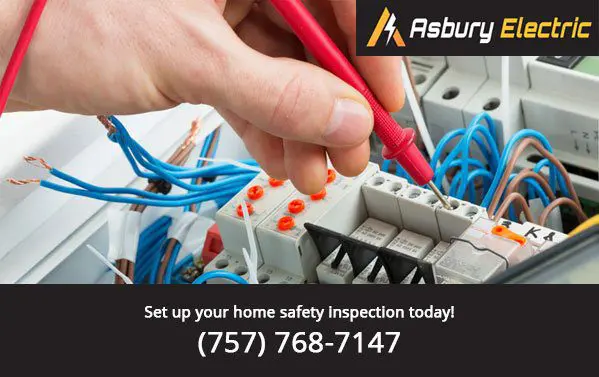Keeping your home safe is an important detail that can be often overlooked in the hustle and bustle of everyday life. A few minutes of preventative maintenance and quick checks will allow you to keep your loved ones safe, without taking up large portions of your time. Here are some home electrical safety tips on what to look for when checking the electrical items in your home to prevent any mishaps. If you have more concerns or questions, Asbury is here for all your full service electrical repairs!
Appliances
- If you are not using an appliance, unplug it and put the cord safely away, where pets or children can’t reach them. Examples – toaster oven, coffee pot
- When purchasing a new appliance, make sure that it has been tested by a reputable consumer laboratory, such as Underwriters Laboratories. Take time to read reviews about the item to see if there have been any issues.
- Stay away from water when operating appliances – no wet hands, don’t stand in a puddle, etc.
- Another home electrical safety tip that is often overlooked is the importance of contacting a certified repair person if you need any work done on your appliances – do not attempt even a minor repair by yourself. Not only could you damage the appliance, or create a fire hazard, you will void the warranty on the appliance if you work on it yourself.
- Items that generate heat, such as clocks, computers, radiators, heating vents, and televisions all need room to “breathâ€. Make sure they have enough room for air circulation and aren’t in contact with blankets, drapes, toys, or combustible materials. Not only will this prevent fires from occurring, it will also prolong the life of your appliance by allowing it to run more efficiently.
Cords
- If an electrical cord does not reach the intended outlet easily, choose another outlet or a longer cord.
- Do not secure cords in place with staples or nails – use zip ties or tape.
- Check cords regularly for frays, knicks, or other issues. When using holiday lights or other seasonal items, check them before each use.
- Cords should never run under a rug. This is a really important home electrical safety tip that is often overlooked out of convenience. They can become a tripping hazard, it is difficult to check for frays, and covering them will prevent them from being as cool as possible.
- Do not use extension cords for an extended period of time. Make other arrangements if you plan on using the power source permanently, as extension cords are designed for temporary use.
Outlets
- Do not overload outlets with too many cords or power strips. Use another power source to prevent a fire hazard or a power surge.
- Cover unused outlets with a child-safety cap to prevent anything except intended cords from going into the outlet.
- Ensure that all outlets are securely covered by outlet plates so that nothing can disturb the wiring.
- Install ground fault circuit interrupter (GFCI) outlets in hazardous areas – areas that may be exposed to water, such as bathrooms, near pools, in crawl spaces, and in the kitchen.
Light Bulbs
- Turn off and unplug a light fixture before changing the light bulb. A common sense home electrical safety tip that we sometimes forget in our hurry to fix things.
- Properly screw in light bulbs – loose bulbs can cause sparks.
- Opt for more energy efficient bulbs, such as compact fluorescent (CFL) bulbs to replace older bulbs. These will save you money on your energy bill and are safer to use. If a CFL bulb does break, you should open a window and have all people and animals leave the room for fifteen minutes to allow the area to air out.
Outdoors
- If you encounter a downed power line, do not approach it. Contact the police and the power company immediately.
- When working from a ladder, make sure there are no power lines nearby that you could fall onto if the ladder tips over.
- Keep trees pruned away from power lines and do not allow branches to hang over your house. This is not only a home electrical safety tip, but it will also prevent the cost of your home insurance from going up.
- Stay out of water during a lightning storm – no pools, puddles, rivers, ocean, etc.
Electricity has become such a part of our daily life that we don’t always think about the power that comes with it. Proper installation, maintenance, and common sense are the best ways to keep your home and your loved ones safe. If you have any questions about electrical safety or need an expert opinion about full service electrical repairs, please call Asbury Electric, we are more than happy to help!

